library_name: transformers
license: cc-by-nc-4.0
pipeline_tag: text-generation
tags:
- text-to-sql
- reinforcement-learning
SLM-SQL: An Exploration of Small Language Models for Text-to-SQL
Important Links
📖Arxiv Paper | 🤗Hugging Face Paper | 🐙GitHub Repository | 🤗HuggingFace Collection | 🤖ModelScope Collection |
News
July 31, 2025: Upload model to modelscope and huggingface.July 30, 2025: Publish the paper to arxiv
Abstract
Large language models (LLMs) have demonstrated strong performance in translating natural language questions into SQL queries (Text-to-SQL). In contrast, small language models (SLMs) ranging from 0.5B to 1.5B parameters currently underperform on Text-to-SQL tasks due to their limited logical reasoning capabilities. However, SLMs offer inherent advantages in inference speed and suitability for edge deployment. To explore their potential in Text-to-SQL applications, we leverage recent advancements in post-training techniques. Specifically, we used the open-source SynSQL-2.5M dataset to construct two derived datasets: SynSQL-Think-916K for SQL generation and SynSQL-Merge-Think-310K for SQL merge revision. We then applied supervised fine-tuning and reinforcement learning-based post-training to the SLM, followed by inference using a corrective self-consistency approach. Experimental results validate the effectiveness and generalizability of our method, SLM-SQL. On the BIRD development set, the five evaluated models achieved an average improvement of 31.4 points. Notably, the 0.5B model reached 56.87% execution accuracy (EX), while the 1.5B model achieved 67.08% EX.
Framework
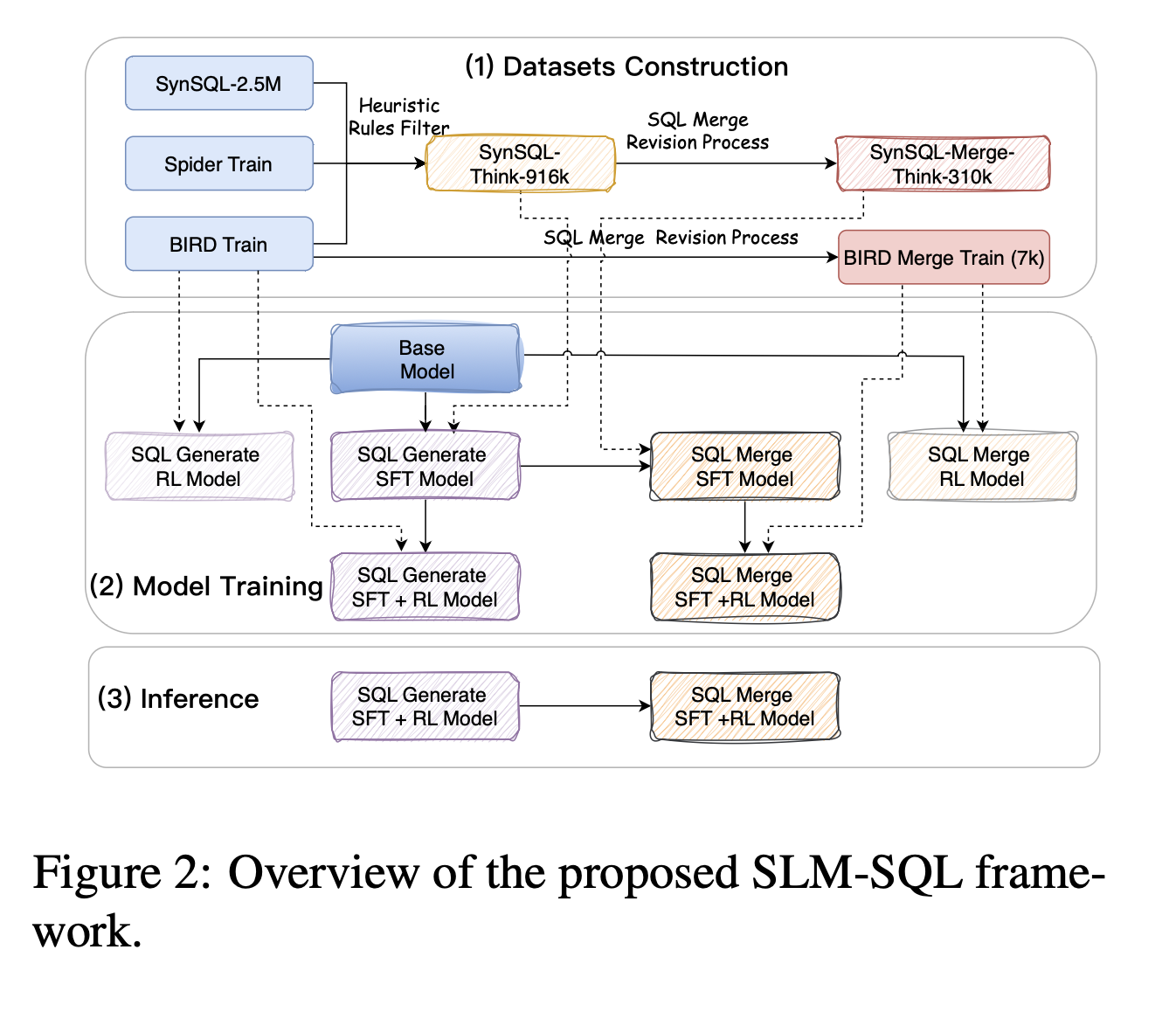
Main Results
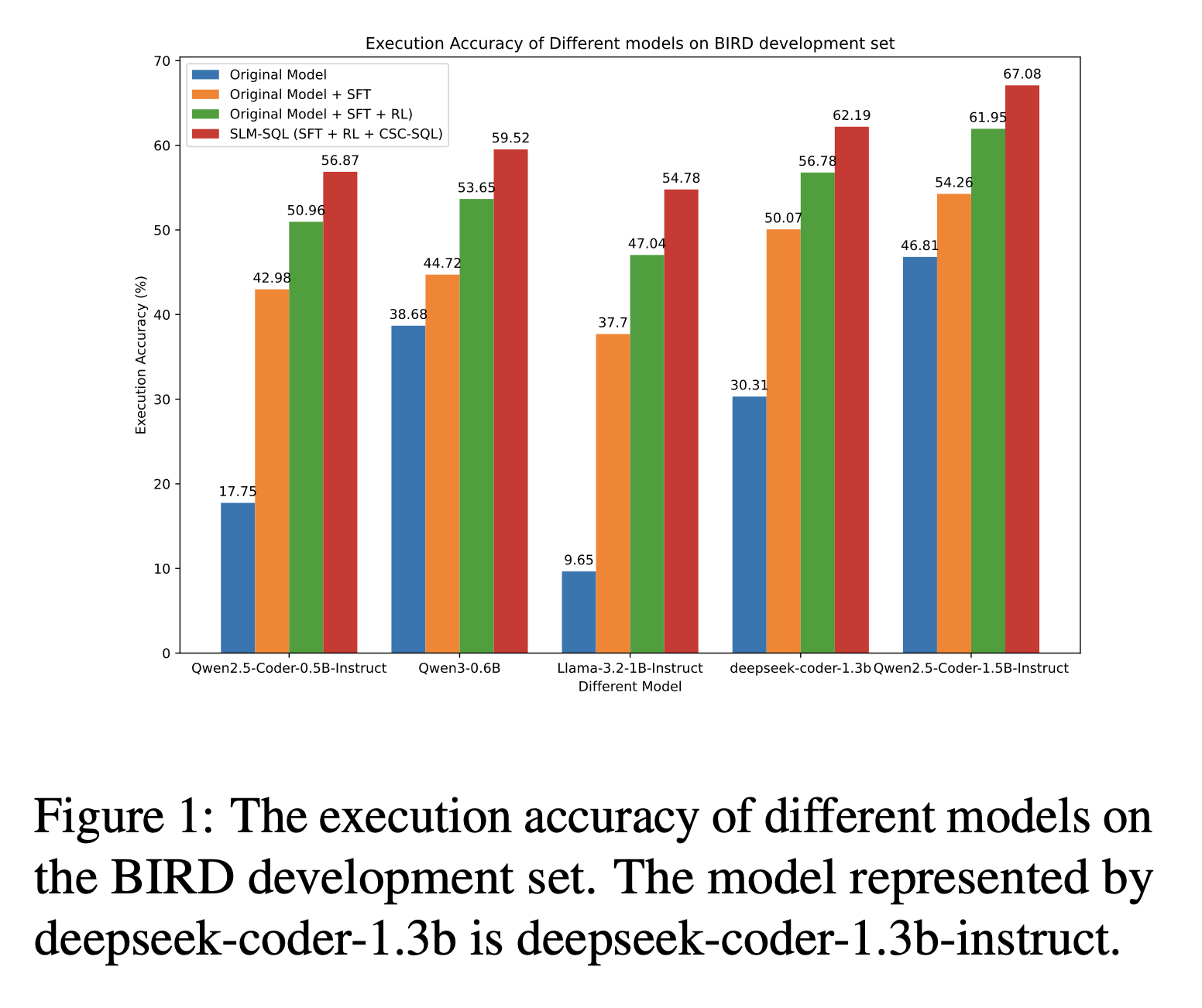
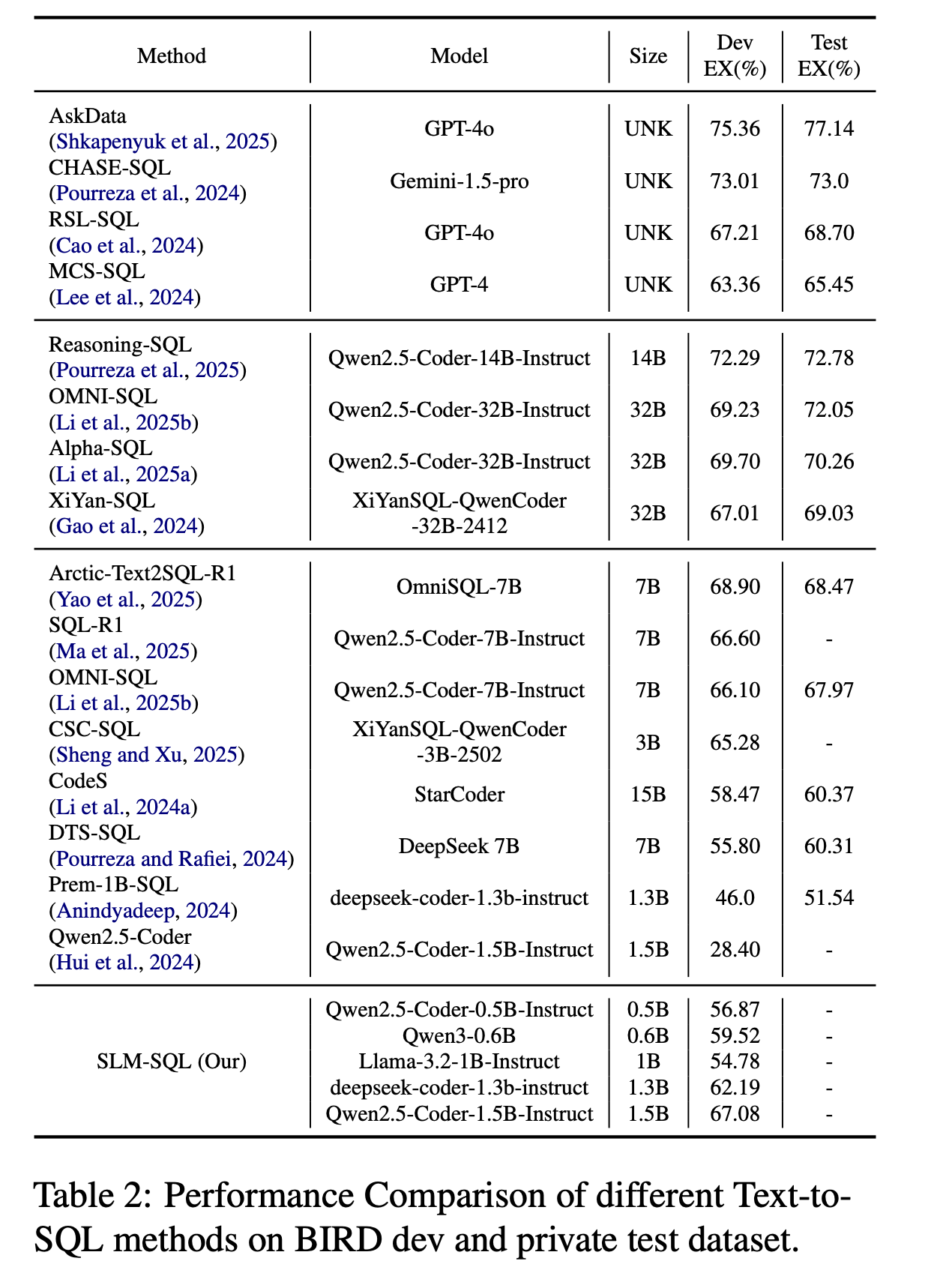
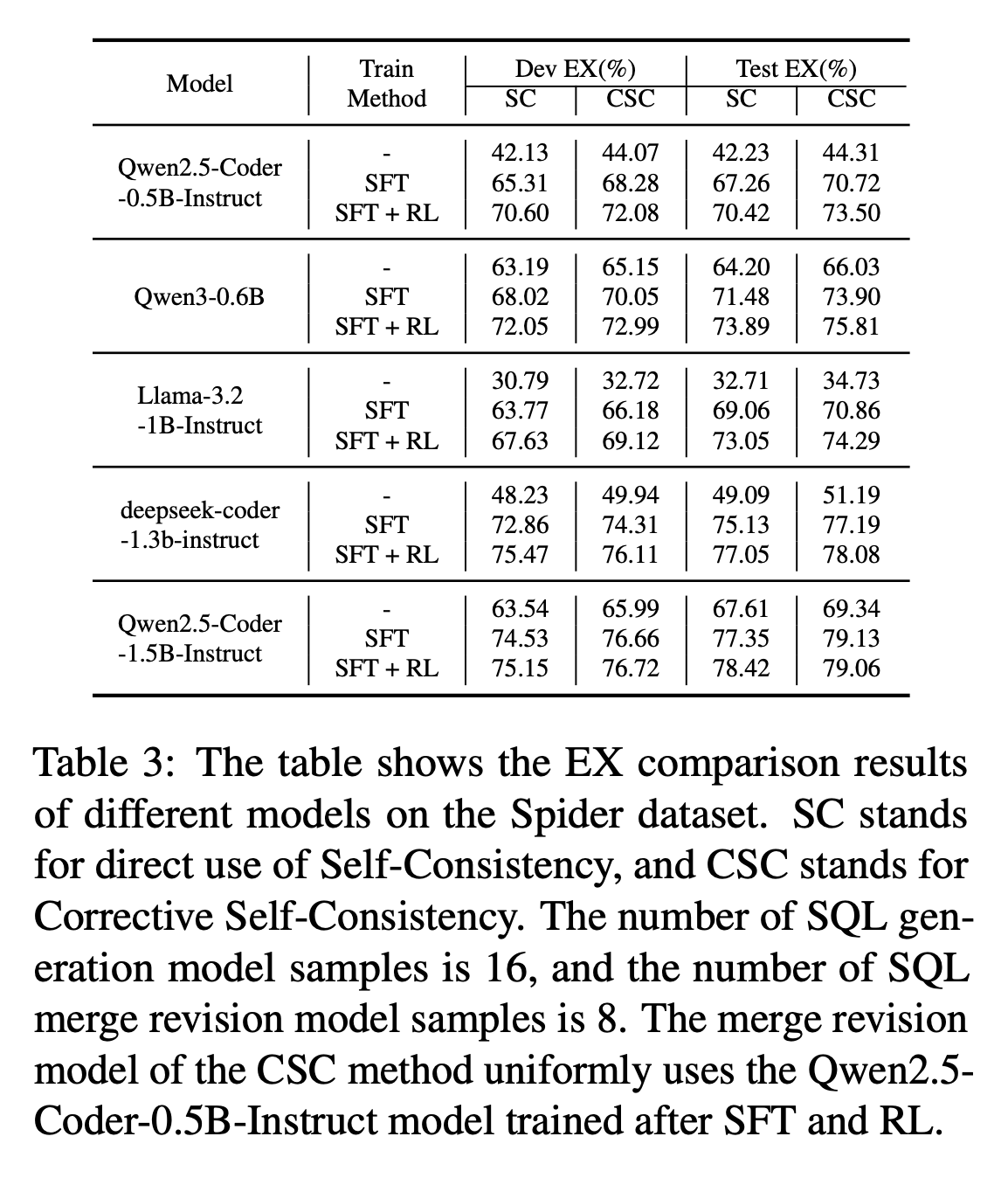
Performance Comparison of different Text-to-SQL methods on BIRD dev and test dataset.
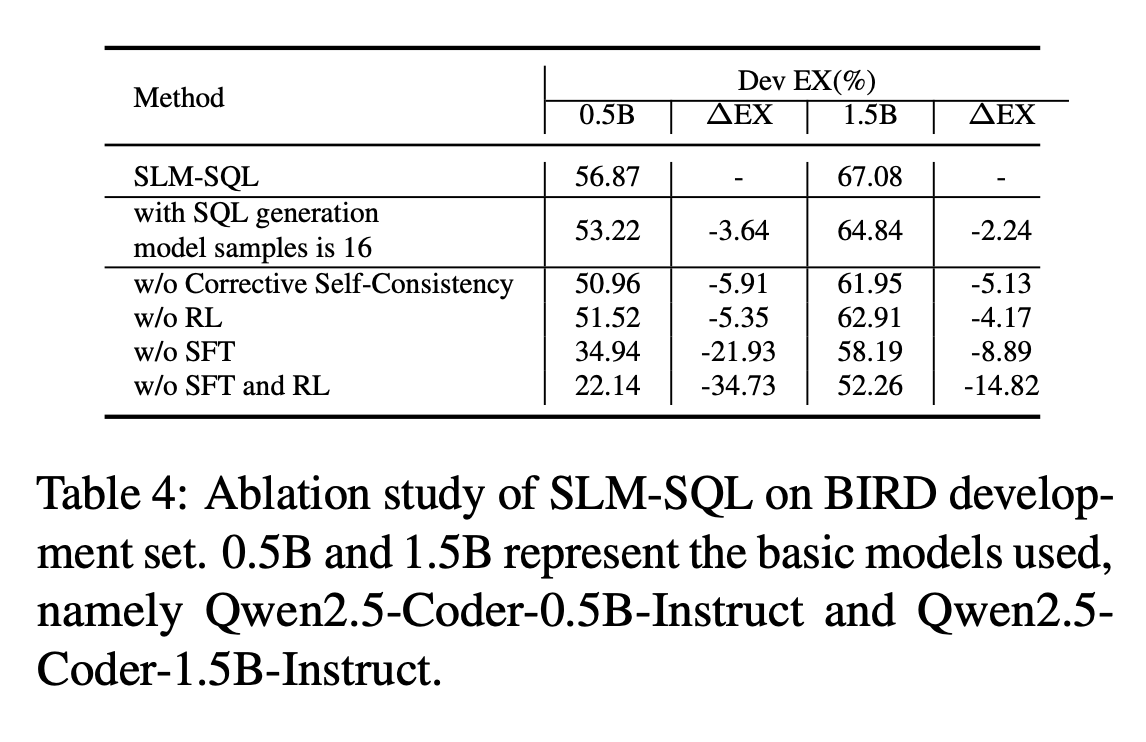
How to Use
You can easily use this model with the Hugging Face transformers library. Below is a general example for inference:
from transformers import AutoModelForCausalLM, AutoTokenizer
import torch
# Load the model and tokenizer
model_name = "cycloneboy/SLM-SQL-1.5B" # Example: You can choose other models from the table below
tokenizer = AutoTokenizer.from_pretrained(model_name)
model = AutoModelForCausalLM.from_pretrained(
model_name,
torch_dtype=torch.bfloat16, # or torch.float16, adjust based on your GPU
device_map="auto" # Automatically map model to available devices
)
model.eval()
# Example prompt for Text-to-SQL
# Replace this with your natural language query for a specific database schema
prompt = """
[Instruction]: Given the following database schema, generate a SQL query that answers the question.
[Schema]:
CREATE TABLE Student (StuID INT, Name TEXT, Age INT, Sex TEXT, Major TEXT, Advisor INT, Graduated BOOL);
CREATE TABLE Course (CrsID INT, Title TEXT, Dept TEXT, Credits INT);
CREATE TABLE Enrollment (StuID INT, CrsID INT, Grade REAL);
CREATE TABLE Advisor (AdvID INT, Name TEXT, Dept TEXT);
[Question]: What is the average age of students who are taking 'Database' course?
"""
inputs = tokenizer(prompt, return_tensors="pt").to(model.device)
# Generate SQL query
outputs = model.generate(
**inputs,
max_new_tokens=256,
num_beams=1, # Adjust for different decoding strategies
do_sample=False,
temperature=0.0,
top_p=1.0,
eos_token_id=tokenizer.eos_token_id
)
generated_text = tokenizer.decode(outputs[0], skip_special_tokens=True)
print(generated_text)
# The output will contain the prompt and the generated SQL.
# You might need to parse the generated_text to extract only the SQL query.
Model
| Model | Base Model | Train Method | Modelscope | HuggingFace |
|---|---|---|---|---|
| SLM-SQL-Base-0.5B | Qwen2.5-Coder-0.5B-Instruct | SFT | 🤖 Modelscope | 🤗 HuggingFace |
| SLM-SQL-0.5B | Qwen2.5-Coder-0.5B-Instruct | SFT + GRPO | 🤖 Modelscope | 🤗 HuggingFace |
| CscSQL-Merge-Qwen2.5-Coder-0.5B-Instruct | Qwen2.5-Coder-0.5B-Instruct | SFT + GRPO | 🤖 Modelscope | 🤗 HuggingFace |
| SLM-SQL-Base-1.5B | Qwen2.5-Coder-1.5B-Instruct | SFT | 🤖 Modelscope | 🤗 HuggingFace |
| SLM-SQL-1.5B | Qwen2.5-Coder-1.5B-Instruct | SFT + GRPO | 🤖 Modelscope | 🤗 HuggingFace |
| CscSQL-Merge-Qwen2.5-Coder-1.5B-Instruct | Qwen2.5-Coder-1.5B-Instruct | SFT + GRPO | 🤖 Modelscope | 🤗 HuggingFace |
| SLM-SQL-Base-0.6B | Qwen3-0.6B | SFT | 🤖 Modelscope | 🤗 HuggingFace |
| SLM-SQL-0.6B | Qwen3-0.6B | SFT + GRPO | 🤖 Modelscope | 🤗 HuggingFace |
| SLM-SQL-Base-1.3B | deepseek-coder-1.3b-instruct | SFT | 🤖 Modelscope | 🤗 HuggingFace |
| SLM-SQL-1.3B | deepseek-coder-1.3b-instruct | SFT + GRPO | 🤖 Modelscope | 🤗 HuggingFace |
| SLM-SQL-Base-1B | Llama-3.2-1B-Instruct | SFT | 🤖 Modelscope | 🤗 HuggingFace |
Dataset
| Dataset | Modelscope | HuggingFace |
|---|---|---|
| SynsQL-Think-916k | 🤖 Modelscope | 🤗 HuggingFace |
| SynsQL-Merge-Think-310k | 🤖 Modelscope | 🤗 HuggingFace |
| bird train and dev dataset | 🤖 Modelscope | 🤗 HuggingFace |
TODO
- Release inference code
- Upload Model
- Release training code
- Fix bug
- Update doc
Thanks to the following projects
Citation
@misc{sheng2025slmsqlexplorationsmalllanguage,
title={SLM-SQL: An Exploration of Small Language Models for Text-to-SQL},
author={Lei Sheng and Shuai-Shuai Xu},
year={2025},
eprint={2507.22478},
archivePrefix={arXiv},
primaryClass={cs.CL},
url={https://arxiv.org/abs/2507.22478},
}
@misc{sheng2025cscsqlcorrectiveselfconsistencytexttosql,
title={CSC-SQL: Corrective Self-Consistency in Text-to-SQL via Reinforcement Learning},
author={Lei Sheng and Shuai-Shuai Xu},
year={2025},
eprint={2505.13271},
archivePrefix={arXiv},
primaryClass={cs.CL},
url={https://arxiv.org/abs/2505.13271},
}